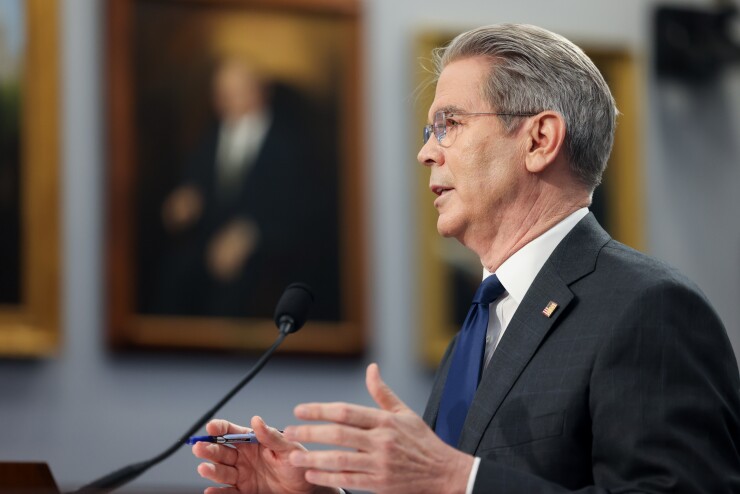
Treasury Secretary Scott Bessent on Tuesday told lawmakers in the House Appropriations Committee that the U.S. is renegotiating trade deals with 17 of its 18 largest partners — with the notable exception of China — and expects most to be finalized by year's end.
In defending the Trump administration's aggressive use of tariffs, Bessent sought to downplay concerns about a sprawling trade war, arguing that the U.S. was making progress with major trading partners. He acknowledged the tariffs were unpopular with many American allies but framed them as necessary, especially given that some other countries have put tariffs on the U.S. in the past.
"Approximately 97 or 98% of our trade deficit is with 15 countries. Eighteen percent of the countries are our major trading partners, and I would be surprised if we don't have more than 80 or 90% of those wrapped up by the end of the year," Bessent said. "And … in negotiating with some of them, they may not like the tariff wall that President Trump has put up, but they have [tariffs as well]."
In an exchange with committee chair David Joyce, R-Ohio, Bessent said some renegotiated trade agreements could come as early as this week.
"I expect that we can see a substantial reduction in the tariffs that we are being charged, as well as non-tariff barriers … so that is proceeding very well," he said. "Perhaps as early as this week, we will be announcing trade deals with some of our largest trading partners."
Bessent was pressed by committee ranking member Steny Hoyer, D-Md., on whether the U.S. was in a recession, alluding to President Donald Trump's assertion in a
"I believe in data, and there is nothing in the data that shows that we are in a recession," Bessent said. "As a matter of fact, the jobs report has surprised to the upside."
Bessent's optimism comes in contrast to the economic concerns wracking the financial industry. Nearly
When Hoyer asked Bessent if he would reconsider his position if the next quarter shows continued negative growth — meeting the textbook definition of a recession — Bessent cautioned against reading too much into the data, which he said could contain a lot of short-term fluctuations. U.S. GDP is estimated to have slipped 0.3% in the first quarter of 2025, marking the sharpest decline since early 2022.
"Congressman, these economic numbers are noisy and subject to substantial revision," Bessent said. "So I, having looked at a detailed analysis, would believe that the first-quarter GDP would be revised upward."
Hoyer expressed concern also with steep cuts the Trump administration has proposed for the Internal Revenue Service, noting the agency had long been underfunded and lacking in staff. The Maryland lawmaker warned that slashing up to 40% of the agency's workforce and 20% of its budget would cripple enforcement, gut morale and allow wealthy Americans to cheat on their taxes.
"[Tax cheating], of course, increases what others pay and explodes the deficit," Hoyer said. "The story is the same across the federal government. Americans are reeling from this uncertainty in their economy and in their government, they need answers, more than that, they need an adult in the room."
Bessent defended the cuts as focused on reducing paper-heavy processes and trimming outdated IT and inefficiencies, claiming Treasury had already saved $2 billion without affecting operations.
"We achieve these cost savings by eliminating renegotiating and de-scoping wasteful IT and professional services contracts and addressing longstanding inefficiencies, such as auto-renewed licenses unused for years [and cutting] administrative costs, with a particular focus on paper processing," Bessent said. "Last year, the IRS spent approximately $450 million on paper processing with nearly 6,500 full-time staff dedicated to the task through policy changes and automation. The Treasury aims to reduce this expense to under $20 million by the end of President Trump's second term."
Bessent said the IRS is decades behind on IT modernization, estimating such inefficiencies have wasted up to $50 billion, and said current staff cuts are simply returning the agency to levels it was at before a temporary personnel and infrastructure surge he said was driven by the Inflation Reduction Act, which former President Joe Biden signed in 2022.
The Department of Government Efficiency, led by Elon Musk, has






